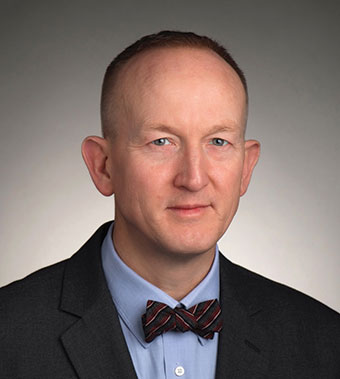Next story: Kennedy vs. Grant: What's Good For the Goose...
The Single-Payer Answer to Our Broken Healthcare System
by George Sax

A skeptical, well-dressed middle-aged man was the first person to take advantage of Dr. Andy Coates’s surprise invitation to the audience gathered Thursday evening in D’Youville College’s Madonna Lounge to hear him discuss the need and prospects for a national single-payer health insurance system. Instead of immediately proceeding to his remarks, Coates, an Albany physician and a nationally recognized expert, asked the approximately 100 people in the audience if any of them wanted to ask a question, and this questioner challenged the very idea of national health insurance.
“I don’t trust the federal government,” he told Coates. “The postal system had a monopoly and they screwed it up.” Private delivery firms, he charged, had done a better job and dismissed the idea that the government could run a health insurance system.
“I have no love for the federal government,” Coates replied, but, he went on, there was no other realistic choice, and the problem was too crucial, too urgent to avoid. “Tens of millions of Americans are without insurance,” Coates told him, and many will remain un- or underinsured even after the Affordable Care Act—Obamacare—is finally implemented. “I think it’s a minimum of a modern democracy,” he said, that its citizens have access to decent healthcare.
Coates is president of Physicians for a National Health Program, whose local chapter was a sponsor of the forum, which came almost exactly a year after Coates first spoke in Buffalo on the same topic. In his data-filled presentation, he conceded that Obamacare will reduce the often critical healthcare problems of millions of Americans, but he focused on the flaws and inadequacies of this program, and the superiority of a single-payer system. Under the former, somewhere from 40 to 60 percent of the nation’s uninsured will still be without insurance, and the inefficiencies, excessive profit-taking, and inferior care will continue to a great extent. This is because, single-payer advocates say, far from being a socialistic scheme, as rightists have called it, it leaves in place the present profit incentives and centers that deform and restrict healthcare. (Wednesday’s New York Times ran an article about the profitable adaptation to Obamacare of Wellpoint, a large insurer and a former corporate opponent of the program.)
Under a single-payer system, the government is the primary payer of everyone’s healthcare bills, virtually a population-wide extension of Medicare. Coates zeroed in on both the human costs of the present system and the structural infirmities of the Affordable Care Act. The National Institute of Medicine estimated several years ago that there were 25,000 additional deaths each year in this country due to lack of healthcare. Coates pointed to another study that estimated there were 44,000 annual deaths. In this state, Coates noted, where 17.5 percent lack insurance, this works out to 2,254 deaths.
Americans, he told the audience, pay more for medical care, and suffer poorer health than people in other advanced nations. Obamacare, he said, with its reliance on market forces, is ill-designed to solve these problems: “There are 10 essential benefits [mandated], but no standard benefit package, no regulation of premiums, deductibles, and co-pays…Premiums are [often] held low by exorbitant out-of-pocket responsibilities.”
“The present US per capita expenditure on healthcare is sufficient” to finance a single-payer system, Coates argued. Per capita, there is $8,900 in private annual spending and $5,749 in public expenditure, much more than is spent, for example, in Canada, a country with a national, all-inclusive Medicare system and better health outcomes. Insured Americans, he said, each pay an average $606 in out-of-pocket expenses, Canadians $148.
Coates suggested that Massachusetts’ “Romneycare,” after which Obamacare was modeled, offers a sort of forecast of what such market-based system will do. “Over the last five years,” he said, “premium costs have been rising and benefits falling” in that state. “Canada has succeeded in bending the cost curve,” Coates observed, but he expressed skepticism that the American model will.
“The growing polarization” in American income and wealth, Coates explained, is, in part, driven by healthcare. In an email this week, he told Artvoice, “Many health problems stem from the social determinants of health.”
Speaking before Coates, Dr. Myron Glick, CEO and founder of Buffalo’s Jericho Road Community Health Center, which provides care for underserved people, told of a case that, he said, “illustrated how broken our health system is.” A man who lost his insurance a decade ago, was repeatedly in and out of local emergency rooms, and diagnosed with diabetes. A visiting nurse called Glick, begging him to help because she couldn’t find a family physician to see him. “Even with Medicaid,” Glick said, “this man didn’t have access to a family doctor.” Obamacare relies on Medicaid to enroll millions of the uninsured. It will also, he said, “leave in place people who can profit from the present system.”
Later, Glick asked Coates what could be done to advance the single-payer cause in the face of large political obstacles. Coates told him that he has “a hell of a lot more confidence in our communities” than in national politics. “All politics is local,” he said. The tide of opinion is slowly turning in favor of a genuine national health system, he said, and gaining it would give Americans a sense of pride in their country. “Now,” he said, “things aren’t working well in this country.”
blog comments powered by Disqus|
Issue Navigation> Issue Index > v13n6 (Week of Thursday, February 6) > The News, Briefly > The Single-Payer Answer to Our Broken Healthcare System This Week's Issue • Artvoice Daily • Artvoice TV • Events Calendar • Classifieds |









 Current Issue
Current Issue